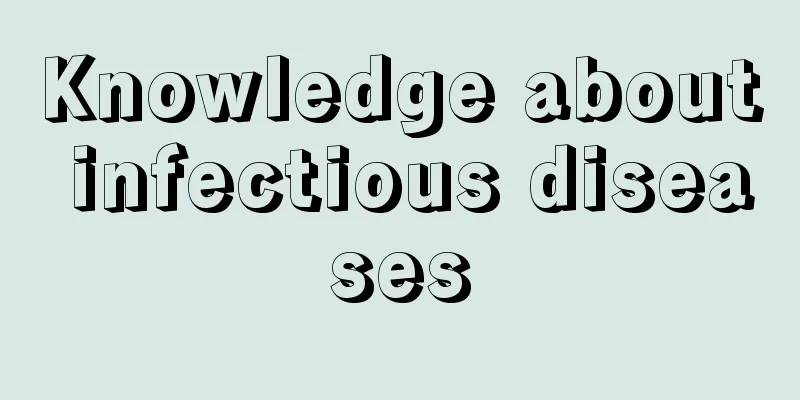Knowledge about infectious diseases

|
As we all know, among all kinds of diseases, the most serious one is actually infectious disease. If someone in life carries an infectious virus, it will be transmitted to people around them. So, how can we avoid contracting infectious diseases? We need to pay special attention to some problems in our daily lives. Today we will tell you about some relevant knowledge about infectious diseases. Protecting yourself and your loved ones from infectious diseases can seem like a daunting task. In addition to the obvious symptoms such as runny nose and cough, you may also want to know more practical preventive measures. The skin is a natural barrier to prevent infection by harmful microorganisms, but clever "germs" will find other alternative ways to enter the body and cause infection. By making some simple changes in your life, you can effectively prevent infectious diseases.1. Wash your hands frequently. Did you know that microorganisms can live on inert surfaces for anywhere from a few minutes to a few months? Imagine if these disease-causing microorganisms could live on computer keyboards, electrical switches, or even on sidewalk handrails! Surprisingly, most people don’t know that effective hand washing is the best preventive measure. The CDC recommends washing hands thoroughly with soap and water, then drying them with a paper towel. In places where running water is not available, alcohol-based gels can suffice for hand washing, although they are not as effective as soap and water. 2. Do not share personal items. Toothbrushes, towels, razors, handkerchiefs and nail clippers can all be sources of infectious agents (bacteria, viruses and fungi). In kindergarten, children are usually taught to share toys but learn to control their hands. Try to remember not to share your personal belongings with others. 3. Cover your mouth when you cough or sneeze. In the same spirit, good personal hygiene includes not only personal cleanliness but also the traditional practice of covering your mouth when you cough and sneeze.Why is this important even when you are not sick? Because for most infections, the disease-causing microorganisms begin growing and dividing long before symptoms appear. Coughing or sneezing can spread these germs through the air. It is recommended to cover your mouth with your arms or sleeves rather than your hands. 4. Get a flu shot. The human immune system is designed to "remember" previous infections. When the body encounters a microorganism that previously caused an infection, it increases production of white blood cells and antibodies to prevent a second infection. Therefore, by vaccinating, you can trick the body into thinking it has been infected with certain microorganisms before, thereby improving its defenses against infectious diseases. 5. Use safe cooking methods. Poor food preparation and eating habits are often the cause of foodborne illness. In fact, microorganisms love all foods, especially when they are kept at room temperature. Refrigeration slows or stops the growth of most microorganisms. Use separate cutting boards for cooked and raw foods, and make sure to wash all fruits and vegetables before eating. 6. Be a smart traveler. It is easy to contract infectious diseases while traveling, especially when traveling to less developed areas. If the water at your travel destination is questionable, be sure to have a safe source of water, such as bottled water, for drinking and brushing your teeth. Eat cooked foods and avoid raw fruits and vegetables. It is recommended to keep all immunizations up to date depending on the travel destination.7. Practice safe sex. Sexually transmitted diseases are probably the most preventable infectious diseases. Being smart about safe sex (using condoms) can prevent the spread of infectious bacteria or viruses from one person to another. 8. Don’t pick your nose (or mouth or eyes). It is not only a social taboo, but also leads to the spread of various diseases. If you look around you, you’ll notice many people putting their hands on their faces. Many microbes prefer the warm and moist environment of the nose, as well as the mucous membrane-covered surfaces of the eyes and mouth. By avoiding touching these areas, infectious diseases can be easily prevented. 9. Be cautious when interacting with animals. Diseases transmitted from animals to humans are called "zoonotic diseases" and they are more common and widespread than people realize. If you have pets, make sure they get regular checkups and are up to date on their vaccinations. 10. Watch the news. Having a good understanding of current events can help you make informed decisions about travel and other recreational activities. For example, the bird flu outbreak in Asia is worthy of your attention. |
>>: The transport form of ammonia in the blood
Recommend
Symptoms and treatment of gout
Gout is a disease that many friends suffer from. ...
What medicine is better for moderate fatty liver and what should I pay attention to
Moderate fatty liver disease is very common in li...
How to remove stinky shoes?
Shoes of different quality may have different sme...
Syndrome differentiation and treatment of liver depression and blood dryness type skin cancer
my country has records of traditional Chinese med...
Is baking soda toxic?
As people have more and more entertainment option...
How does mercury poisoning occur? Mercury poisoning is caused by this
Mercury poisoning is a word we often hear in our ...
How to remove the blackened teeth caused by smoking
Nowadays, more and more people are smoking, inclu...
How to remove oil stains from clothes
In daily life, we often come into contact with oi...
What is amyotrophic lateral sclerosis?
There are many types of lateral sclerosis, and am...
What medicine is better for perianal abscess
Perianal abscess is a very torturous problem beca...
My nose itches and bleeds when I rub it
If your nose itches and bleeds when you rub it, y...
How to treat weakness in limbs and body aches
Weak limbs and body aches can be said to be a typ...
How to clean the belly button?
After a day's work, we have to wash our bodie...
How to prevent liver cancer? 3 measures to prevent liver cancer are recommended for collection
In today's society, the pace of life in first...
What are the symptoms of benign esophageal tumors?
Benign esophageal tumors are rare, accounting for...









